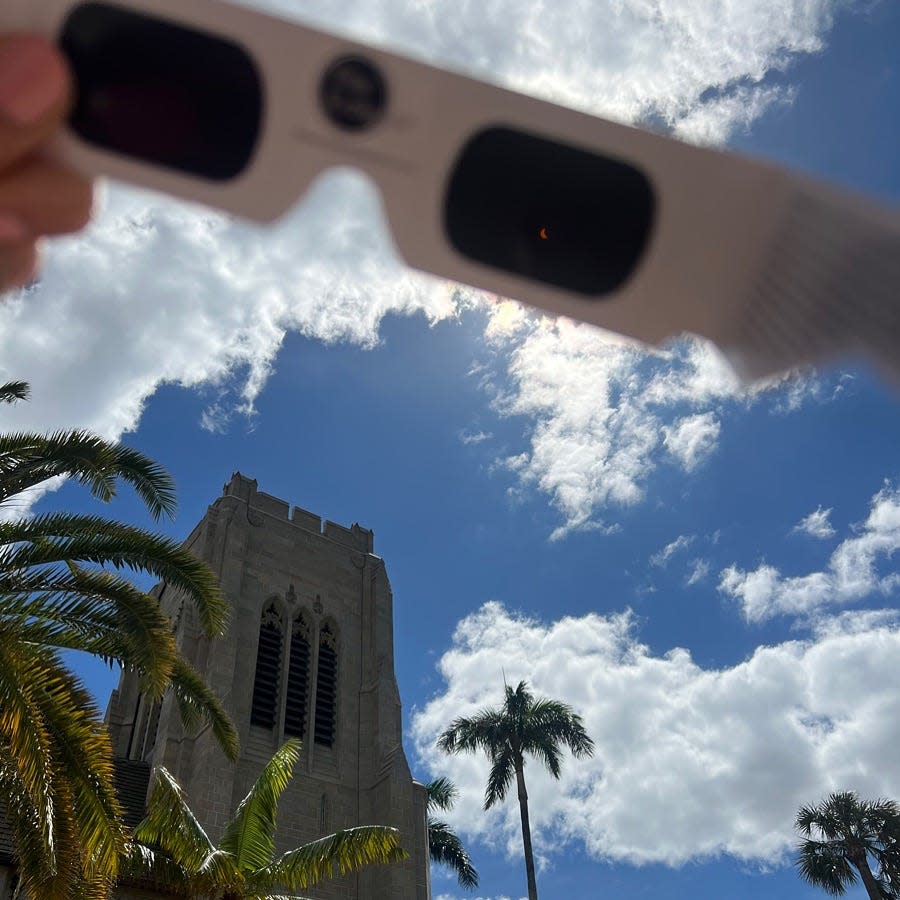Opinion: Celestial marvel had people looking in the same direction for once

So, I didn’t buy into Eclipse-o-Mania. Partly because I’ve never been a science guy — the worst grade I ever got in my life was in middle school biology. And partly because it was barely a partial eclipse here in South Florida. The totality of the experience was lost on us.
If I’m honest, as a person of faith, there was a third reason I was wary of the whole phenomenon. So much religious fanaticism and so many doomsday prophecies have surrounded past astronomical events that it clouds the majestic and transcendent experience. To marvel in the beauty and splendor of God’s creation is enough. There is no need to overlay it with our own twisted agendas and conspiratorial readings of Scripture.
In this case, the end is not near.
But what actually moved me was seeing so many people from all walks of life, political persuasions, and backgrounds all facing the same direction at the same time. There’s not a whole lot of unity in our country these days, so I think this especially stood out.
My Facebook timeline was filled with images of people wearing those dark eclipse glasses, along with scores of mediocre cellphone photos of the sun and moon. And I loved this! There was tremendous joy and delight on the faces of children and adults alike as they gazed in wide wonder at the sky.
From a Christian perspective, I kept thinking about the Star of Bethlehem. How the magi a/k/a the three wise men a/k/a the three kings gazed upwards at the sky and followed the star in the days following the birth of Jesus. These three men, known apocryphally as Caspar, Melchior, and Balthazar (their names aren’t in the Bible), were stargazers, early astronomers perhaps. The word “magi” is a Latin version of the Greek magoi, referring to a sect of Eastern holy men. It’s where we get the word “magic.”
Unlike almost all of Jesus’ early followers, they were not Jews expectantly waiting for the messiah. They were Gentiles from a distant land, which made them outsiders. These wise men knew little, if anything, about the God of Abraham, Isaac, and Jacob. And yet something compelled them to follow this star that had risen in the east.
It’s true that most people anticipating this week’s rare solar eclipse weren’t necessarily seeking out a religious experience. We know the science behind why this took place — at least those who paid better attention during science class. Though I still wonder why more people, who believe in the existence of life forms beyond our world without a single shred of evidence, aren’t more open to the idea of a loving Creator who stands beyond our knowing.
But still, this magnificent celestial event evoked a sense of communal awe and camaraderie, which itself may be rarer than the rarest astronomical phenomenon. Fleeting as it may have been, I hope we remember what it is to all look in the same direction for a change. I hope we hold on to the sense of unity forged by our common humanity. And I only regret slightly not picking up a pair of eclipse glasses.
The Rev. Tim Schenck serves as rector of the Episcopal Church of Bethesda-by-the-Sea. His latest book is Devotions for People Who Don’t Do Devotions (Forward Movement).
This article originally appeared on Palm Beach Post: Opinion: Solar eclipse 2024 had people looking in the same direction
